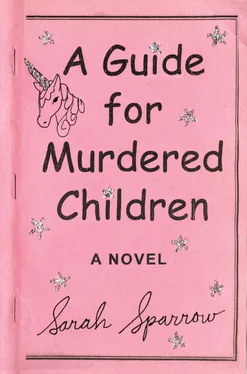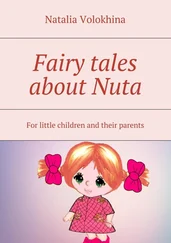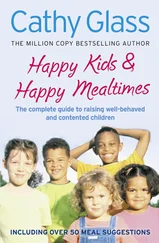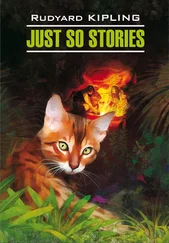Sarah Sparrow - A Guide for Murdered Children
Здесь есть возможность читать онлайн «Sarah Sparrow - A Guide for Murdered Children» весь текст электронной книги совершенно бесплатно (целиком полную версию без сокращений). В некоторых случаях можно слушать аудио, скачать через торрент в формате fb2 и присутствует краткое содержание. Город: New York, Год выпуска: 2018, ISBN: 2018, Издательство: Blue Rider Press, Жанр: Фэнтези, Триллер, Детектив, на английском языке. Описание произведения, (предисловие) а так же отзывы посетителей доступны на портале библиотеки ЛибКат.
- Название:A Guide for Murdered Children
- Автор:
- Издательство:Blue Rider Press
- Жанр:
- Год:2018
- Город:New York
- ISBN:978-0-399-57452-8
- Рейтинг книги:5 / 5. Голосов: 1
-
Избранное:Добавить в избранное
- Отзывы:
-
Ваша оценка:
- 100
- 1
- 2
- 3
- 4
- 5
A Guide for Murdered Children: краткое содержание, описание и аннотация
Предлагаем к чтению аннотацию, описание, краткое содержание или предисловие (зависит от того, что написал сам автор книги «A Guide for Murdered Children»). Если вы не нашли необходимую информацию о книге — напишите в комментариях, мы постараемся отыскать её.
A Guide for Murdered Children — читать онлайн бесплатно полную книгу (весь текст) целиком
Ниже представлен текст книги, разбитый по страницам. Система сохранения места последней прочитанной страницы, позволяет с удобством читать онлайн бесплатно книгу «A Guide for Murdered Children», без необходимости каждый раз заново искать на чём Вы остановились. Поставьте закладку, и сможете в любой момент перейти на страницу, на которой закончили чтение.
Интервал:
Закладка:
She patted his hand and then stood to leave.
“You’ll be fine,” she said. “You just need a moment to integrate. And thank you for giving me your attention! It’s really all that I wanted.”
2.
The new recruits were waiting for him like anxious children in detention when Willow walked in.
Jesus. They’re just kids.
What was Owen thinking?
“They’re greener than green,” the sheriff had said. “But I’m telling you, Dubya, they certainly have the aptitude. Mark my words—in a few months, they’ll be known far and wide as the Cold Case Kids.” Like an amateur soothsayer, he added, “I have a feeling about those two.”
Back when they were partners in Saggerty Falls, Owen had been awed by Willow’s reluctant necromancy. “You, my friend, are spooky,” he’d say. There was that time his beloved Rover disappeared and Willow said he had a “feeling” about the dog’s whereabouts. The next day, he led them through a mile of forest to the animal, accidentally shot dead by a hunter. (Owen futilely tried to get the visiting detective to track the missing Rummer kids the same way.) The sheriff’s lame prognostication about the greenhorns becoming Cold Case legends served to put Willow on notice that hey, Owen Caplan could be spooky too—real schoolyard pissing contest shit. In an oh shit moment, it occurred to him that Adelaide was the secret sauce behind Owen feeling competitive.
After all, Willow got there first.
“The sheriff said you worked Cold Case in Manhattan,” said Lydia, nervously taking the lead.
“That would be correct.”
“He mentioned you had ‘special talents,’” said Daniel. He’d been staring at Willow from the moment he walked in, as if trying to place him.
“More like special needs.”
The three of them laughed and everything got better. Willow realized he was as jittery as they were. It’d been a long time since he had anyone under his wing, and he wasn’t sure he was up for it.
“That was actually my nickname in New York. ‘Special Needs.’ True story.” The couple smiled, warming to him. “So, what do you think of your new job description? It’s a helluva change from being out in the field. You’re definitely not going to have the kind of action you had recently.”
“That’s probably a good thing,” said Daniel.
“Sometimes when you have an encounter like that, you get a little taste and want some more.”
“Not me, sir,” said Lydia. “That’s not my purpose.”
He thought the phrasing was odd. “And what do you think that purpose might be, Deputy Molloy?”
As she began to reply, Daniel cut her off. “To bring justice and closure to those who no longer have a voice.”
“To be their voice,” said Lydia, with gusto.
“Well played,” said Willow. “It’s long hours, with not a lot of satisfaction. Cold Case isn’t glamorous. On TV, they solve everything in an hour—and I mean everything. In the real world, you might work on a case for a year and still be trying to tree the wrong bear.”
“We have three to five months, six at the outset,” said Lydia mechanically.
“How’s that?” said Willow.
The deputy awkwardly explained away the remark, as if it were a joke about being gung ho.
Well, she’s an odd one.
“Let me tell you something,” said Willow. “You crack a case in six months and you’ll be up for some kind of medal.”
“One thing doesn’t make sense to me,” said Daniel. “This is kind of a big deal, right? The money comes through for a Cold Case team and the sheriff handpicks us ? No offense to my partner and me, we’re going to do an amazing job, one hundred percent. But why pick us? And not—I don’t know—a couple of seasoned detectives?”
“Don’t look a gift horse in the mouth,” said Lydia, annoyed.
“Sheriff Caplan had a feeling about you. And as for the ‘seasoning,’ I guess that’s where I come in. Don’t think too hard about it.”
“We’re honored,” said Lydia. “I know we’ll learn a lot from you.” She turned to Daniel and said, “Any other brilliant questions?”
“Nope.”
“More will be revealed,” said Willow.
The Cold Case Kids smiled at each other; indeed it would.
In the Spirit Room, their lighthearted demeanor changed.
Willow noticed the temperature of the space growing colder. The detective started getting “feelings” of his own that he couldn’t identify. He had planned to dip the deputies’ toes in the water by sifting through the contents of a box or two but hung back and watched.
The familiar blueness of the room that sometimes wafted like smoke appeared for a moment — a long moment — wrapping itself around Lydia and Daniel in an embrace of curiosity before migrating to their heads, where it sparkled in excitation like a swarm of cobalt fireflies.
Willow was entranced.
Deputy Molloy was the proactive one. Deputy Doheny monitored her moves in a way that seemed almost chivalrous. She looked like she’d fallen into a trance. She ran her hand over the topmost boxes of the stacks, putting Willow in mind of a professional medium the department once hired when he worked homicide in New York. There was an elegance and focus to her movements that was almost balletic. The area became an enormous stage; the detective had a sense the orchestra was tuning up.
Daniel joined her as she lingered by the box scrawled RUMMER/JULY 4/’00. She lifted the lid and pulled out a tiny T-shirt found at the scene of the roadside abductions. He took it from her hand and held it to his much larger chest, turning to Willow with a smile to show him what was written there:
RISE
1.
She noticed a change and it was scary.
For all Honeychile’s gregariousness and sporadic outbursts of affection, Zelda, in the role of codependent bestie, was a close observer of her brilliant friend’s other moods as well. She understood that what the world (or student body) judged to be standoffish, bitchy, embarrassing or sometimes outright ridiculous — her nickname at school was Funnychile, not meant to be endearing — was simply a misunderstanding of Honeychile’s deep insecurities. It made Zelda so sad! She wanted to “fix” her friend, but lately their enmeshment wasn’t meshing so well. The BFF’s usual words of support had no effect.
Zelda spoke to her own mother about it, using her as a sounding board for her latest theory that the change in Honeychile’s personality might possibly be related to her cleidocranial dysplasia. She’d done a fair amount of Internet research on the subject, though as yet couldn’t confirm or deny. Each time she came across a dreadful user comment on various message boards that invoked horror-film scenarios of what could or probably already had happened to the brains of people afflicted with the condition, she comforted herself by watching YouTube interviews with Gaten Matarazzo, the amazing star of Stranger Things . He was smart— more than smart. He was, like, the smartest kid in the room.
Just like Honeychile.
When her mom offhandedly said, “Maybe she’s just manic-depressive like your uncle Walt,” Zelda went down that Internet rabbit hole faster than Alice herself.
What was it? What was wrong with her bestie?
The teacher expelled Honeychile from class because not only did she start humming “Rise,” but actually started to sing . Really belted it out. The kids were shocked at first and then began to laugh, which only seemed to inspire her. WTF? Zelda knew that Honeychile was a total Katy Perry hater —she liked Pink and Alessia Cara and Twenty One Pilots (and maybe parts of the Chainsmokers and Sia), but held Katy in outright contempt. She was always schooling Zelda on people she’d never heard of, like Amy Winehouse and Nina Simone and that amazing YouTube video of a bald woman who stared right at you the whole time as she sang this incredible breakup song.
Читать дальшеИнтервал:
Закладка:
Похожие книги на «A Guide for Murdered Children»
Представляем Вашему вниманию похожие книги на «A Guide for Murdered Children» списком для выбора. Мы отобрали схожую по названию и смыслу литературу в надежде предоставить читателям больше вариантов отыскать новые, интересные, ещё непрочитанные произведения.
Обсуждение, отзывы о книге «A Guide for Murdered Children» и просто собственные мнения читателей. Оставьте ваши комментарии, напишите, что Вы думаете о произведении, его смысле или главных героях. Укажите что конкретно понравилось, а что нет, и почему Вы так считаете.












